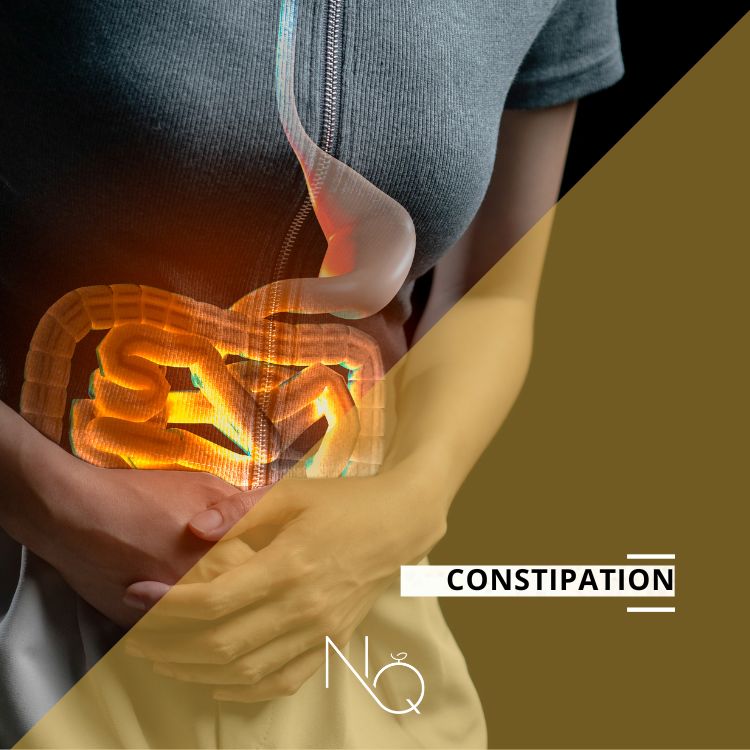Constipation is a common problem that affects people of all ages. In this article, we analyze with a scientific eye what constipation is and how we can deal with it effectively with diet and some lifestyle interventions.
Definition and Characteristics of Constipation
Constipation is a condition in which we may have fewer than three bowel movements per week, stools that are hard, dry or bulky, or stools that are difficult and painful, or a feeling that we do not have a complete bowel movement, that is, not all of the stool has been passed. Of course, there is a large subjective element to the issue of constipation, since each person has a different body and toilet routine. Constipation is not a disease, but sometimes it occurs as a symptom of a medical issue or medication. Constipation is common in all age groups and populations. In Greece, data show that 16% of people have constipation and this is more common in the elderly and women. Below, we will look at some solutions that can greatly improve constipation.
Solution No. 1: Adequate Hydration
Adequate hydration is essential for overall health, including digestive health. Water, as it enters the lumen of the intestine, helps to soften the stool, facilitating its elimination. On the other hand, dehydration leads to hard stools and worsens constipation. Adequate hydration is the first solution for dealing with constipation, before we do any other intervention.
Solution No. 2: Exercise and Movement
Regular physical activity helps the bowel to move, and therefore to improve the promotion of its contents. Exercise makes it easier for stool to move through the digestive tract. Studies have shown that a sedentary lifestyle is associated with a higher risk of constipation, making physical activity an integral component of a holistic approach to digestive health.
Solution No. 3: Diet rich in Plant Fibers
Fiber is divided into two categories, soluble and insoluble. Soluble fiber is found in legumes, oats, rye, barley, fruits, juices, vegetables, and nuts. As they ferment in the intestine, short-chain fatty acids are produced, which facilitate its function. Insoluble fiber, on the other hand, is found in whole grains, beans, cauliflower, avocados, nuts and seeds, unripe bananas, fruit and vegetable peels, and what they do is not get digested by the gut but pass through this and accumulate water. Thus, they reduce the transit time of the feces and make them softer and easier to expel. Examples of foods that we can put in our diet to help with bowel movement are the following:
- whole grains, such as whole-wheat bread and pasta, oatmeal, brown rice, German-style bread
- legumes, such as lentils, black beans, kidney beans, black-eyed peas, fava beans, chickpeas, soybeans, chickpeas
- fruits, such as berries, apples with skin, oranges, pears, banana
- vegetables, such as cauliflower, carrot, broccoli, peas and green leafy vegetables
- nuts, such as almonds, peanuts, pecans, nut butters
Solution No. 4: Probiotics and Prebiotics
The gut microbiota, a complex community of microorganisms that inhabit the digestive tract, plays an important role in digestive health. "Probiotics" are beneficial bacteria that can positively affect intestinal health. Research shows that probiotics may relieve constipation by promoting the balance of gut flora. Foods rich in probiotics are traditional yogurt, kefir, traditional olives, and fermented vegetables such as sauerkraut or pickles. "Prebiotics" are the food of probiotics, and that's why it's good to combine them. Some prebiotics are ground flaxseed, bananas, asparagus, onions, garlic, oats, cocoa. Of course, one can get probiotics by taking a dietary supplement.
Solution No. 5: Herbs
There are herbs that work very well for constipation. For example, 1 teaspoon of honey in a glass of warm water in the morning can help us go to the toilet. The senna drink can be easily prepared as a tea and is a natural laxative with an effect that occurs about 10 hours after consumption. Cascara sagrada is drunk as a drink before bed. Our well-known aloe vera also has laxative properties. Another option is psyllium, which we can easily find in a health food store (careful when swallowing). However, it is important to use herbs carefully, as their effectiveness and safety can vary. Consult a healthcare professional before incorporating herbal supplements into your routine, especially if you have pre-existing health conditions or are taking medication.
Treating constipation involves a multifaceted approach with dietary modifications, lifestyle changes, and, in some cases, the use of supplements. Proper hydration, incorporating fiber-rich foods, maintaining an active lifestyle, taking probiotics, and exploring carefully selected herbal remedies are all evidence-based methods for combating constipation and promoting digestive wellness.
Bibliography
- Muller-Lissner SA, Kamm MA, Scarpignato C, Wald A. Myths and misconceptions about chronic constipation. Am J Gastroenterol. 2005;100(1):232-242.
- McRorie JW, Daggy BP, Morel JG, Diersing PS, Miner PB, Robinson M. Psyllium is superior to docusate sodium for treatment of chronic constipation. Aliment Pharmacol Ther. 1998;12(5):491-497.
- Ford AC, Moayyedi P, Lacy BE, et al. American College of Gastroenterology monograph on the management of irritable bowel syndrome and chronic idiopathic constipation. Am J Gastroenterol. 2014;109 Suppl 1:S2-S26.
- American Gastroenterological Association, Bharucha AE, Dorn SD, Lembo A, Pressman A. American Gastroenterological Association medical position statement on constipation. Gastroenterology. 2013;144(1):211–217.




